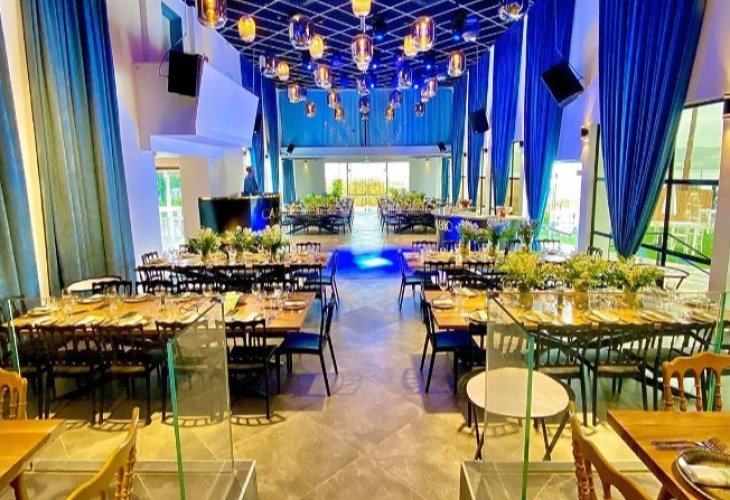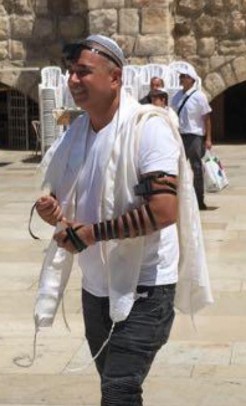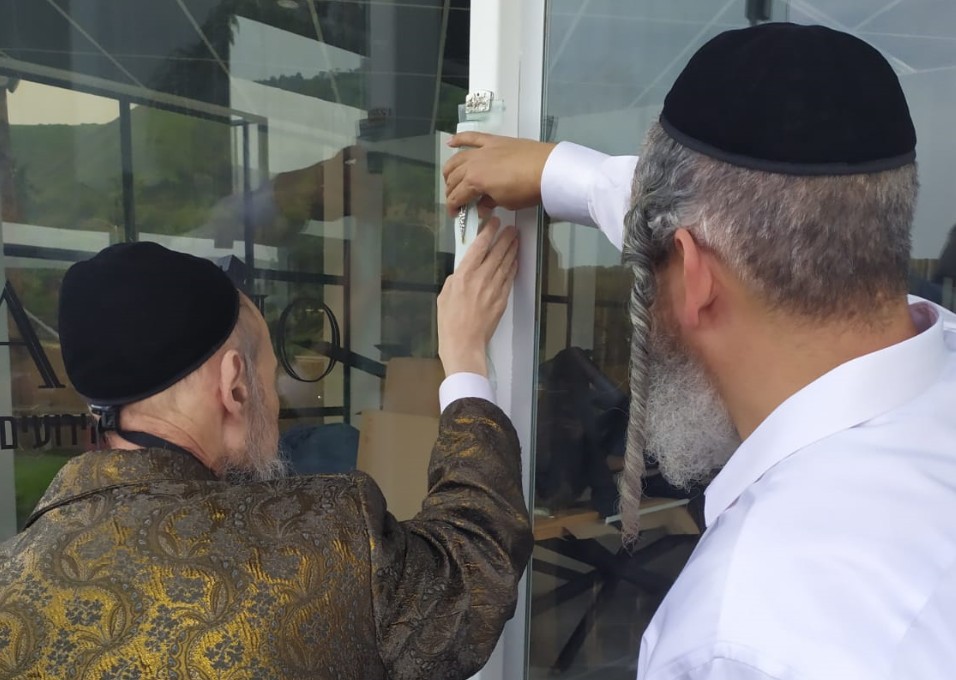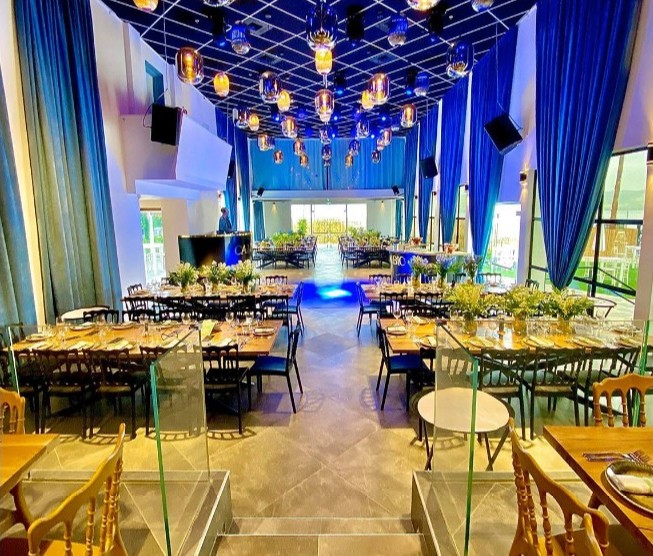From Nightclub Operator to Shabbat Observer: The Journey of Moshe Gabay
Former confidant of Ron Kobi and nightclub owner, Moshe Gabay, underwent a life-changing transformation. He is now embracing Shabbat, sharing how this shift brought him peace and reconnected him with family. On Ron Kobi: "I told him, you cannot fight with Shabbat," and about the transition from nightclub to a kosher event hall.

Few Tiberians haven't heard of the "Selina" event club. The club operated in Tiberias until about a year ago, but since then it has undergone a significant makeover. From a loud entertainment hub, the former club area transformed into a place of calm and serenity that soothes the neighborhood. During its operation, the luxury event club frequently made headlines, mostly negative. In our interview, the former owner states he wasn't surprised "Selina" became one of the more controversial venues. "It was expected," he notes.
The club was founded about nine years ago by the Gavay family brothers as part of a chain of clubs owned by the family. "The club operated near the tomb of Rabbi Meir Baal Haness," says Moshe Gabay, the founder of "Selina." "In a traditional city like Tiberias, operating the club on Shabbat drew quite a bit of criticism, especially due to its proximity to the holy tomb. This added fuel to the fire, making the place a symbol of trampling the religion in the city. In the end, the Tiberians did not like the club," he admits. But nothing prepared the residents of Tiberias for the dramatic transformation that would occur at the site.
 Moshe Gabay
Moshe Gabay"The Illusory Success"
The more one talks with Gabay, the more intriguing his persona becomes, as not long ago he was a confidant to the ousted mayor, Ron Kobi.
Moshe (Muki) Gabay was born in Jerusalem. At age five, his family moved to Tiberias, where he spent his childhood years. As he grew, Moshe left Tiberias but quickly returned to open the 'Selina' nightclub. "I set up clubs nationwide for my older brother," he shares, "for about twenty years, we worked hand in hand. We started with a small pub and an event production company - we would rent a street, bring decor, hire staff, and whatever was needed according to client requests. Our big breakthrough was selling a highly successful club in Eilat, the profit of which allowed us to establish more entertainment venues across the country."
At some point, the brothers' business activities shifted. "After many years working under my brother, I became his partner in some of the clubs we held," Moshe explains, "During those years, we held clubs with a reputation. The illusory success favored us."
Shortly after the club began operating in Tiberias, the brothers realized the club was in a particularly problematic location for such a business, given it's near the tomb of Rabbi Meir Baal Haness. "Although we weren't religious, it disturbed my brother and me, especially with local residents commenting on it. Clearly, it was a particularly problematic location for this kind of business. City residents didn't view the club location favorably, but we felt powerless to change it. "It wasn't intended as a provocation," Moshe clarifies. "We had already invested a vast sum of three million shekels in the structure, and we saw no way back."
He adds, "The problem intensified when the club expanded by 250 additional meters beyond its existing structure, with noise emanating from the club alongside lasers shining, some lighting the tomb compound itself, disturbing worshipers. Yet, the place continued to operate. The investment was enormous for us, and we struggled to let go," he says.
Then one day, something dramatic happened when the club was set on fire. "It was an attempted arson that failed," Moshe recounts. The background to the event was likely criminal. The Tiberias police are still trying to understand who was behind the arson attempt. The suspicion fell on several city residents who visited the club and were presumably angry at the treatment received from the guards. That incident led us to introspection, and I decided to close the club on Fridays. I realized there's a guiding hand from above telling me to stop everything and cease desecrating Shabbat. The decision to close on Shabbat was difficult since the main club activities occur on weekends, so cutting Shabbat drastically reduced club operations."
After closing the place, the Cohen brothers began appealing to the religious public and added kosher certification to the venue. Yet, they quickly changed direction and resumed operations on Shabbat. "The temptation worked overtime, and so we continued to work even on Shabbat," he regretfully states.

A friend named Ron Kobi
"Ron Kobi would come to spend time at the club, and from there our acquaintance began," Moshe recalls. "Later, Ron's car was burnt, which connected us even more, as I too experienced an arson attempt by club visitors, and I didn't like what happened to Ron. When he began running for mayor, he presented a stance of fighting corruption, as remembered. I knew well the goings-on in the city, aware the residents needed someone to fight for them. I told Kobi: 'Are you here to fight corruption? If so, I'm with you.' And indeed, we walked together for a long period."
But then friction arose. During that time, Moshe began undergoing change, realizing Ron Kobi was focusing on incitement and a senseless fight against religion and religious people. In our conversation, he says, "In the first three months, I worked with Ron Kobi and many others to curb corruption and improve the city's condition. After dedicating those months to addressing the city’s problems, Kobi switched focus to a war against religion and the religious. I saw he was heading in a wrong direction, and I told him as much. I explained to him that as a Jew, he cannot fight Shabbat, the source of blessing. Ron wasn't accustomed to people around him opposing his conduct. He doesn’t let others voice opinions different from his, and I was one of the few to tell him what I thought. This led to tension in our relationship. Consequently, I took a step back, and to this day, when necessary, I tell him what I think."
Moshe notes he still maintains contact with Kobi but quickly clarifies, "If he runs again, I won’t vote for him. Tiberias needs different leadership. Ron has abilities and charisma, but a city leader needs a different agenda, one that aims to help residents rather than fight them. I hope one day he seeks forgiveness," he sighs.
Moshe takes a deep breath and returns to the subject of club operation. "Running nightclubs didn't allow me to maintain a normal family life," he shares. "I divorced several times, realizing I couldn't continue this way, deciding: that was it—I’m changing course." And so it was. After 22 years with nightclubs as his primary occupation, Moshe stopped operating 'Selina' and left his other nightclub businesses. Instead, he and his younger brother opened two grocery stores. During that time, Moshe remarried, shortly splitting with his brother. "One of the supermarkets we ran was closed on Shabbat, and when we parted ways, I took the opportunity and kept only the closed branch. Suddenly, without prior intention, I started observing Shabbat."
Why did you start keeping Shabbat?
"At first, I didn’t understand what Shabbat contributes even to one's daily life, but my wife comes from a home where Shabbat is observed, and for her—keeping Shabbat is a life she was used to from childhood and couldn’t do without, today I understand why too. Therefore, she started pushing me towards keeping Shabbat.
"Thus, I began observing Shabbat. Initially, it was complicated, as many things didn’t make sense; after all, I was used to a completely different routine for years. But in time, everything changed. I began to discover the light in Shabbat. The purity, the pure feeling. Suddenly, I also rediscovered my family. I have seven children, thank *Hashem*, and until then, we barely had time together. Once I started keeping Shabbat, I rediscovered my children and my wife. We began having Shabbat meals, and instead of rushing eating to run to the club, I could finally enjoy and reconnect with my family. It was an amazing feeling, so different from what I'd known until then."

Kosher Event Hall
Moshe observed Shabbat for a full year. "During this period, I understood I'd definitively closed that chapter of my life. I decided I wouldn't work on Shabbat anymore, even if offered a fortune," he states. Then came the test: four years after selling the club, the place was set on fire again, and he was offered the chance to own it anew. "It was clear to me I wouldn't return to the nightclub scene," he stresses, "Instead, I clarified to the sellers that I was not intending to establish another club at the location, but to change the building's purpose. I bought the place again, and instead of a Shabbat-desecrating club, I established an event hall maintaining Shabbat's sanctity. Additionally, the hall features two entrances, to separate men and women. Soon, the place will receive strict kosher certification. I hope it'll serve the Torah-observant public while maintaining strict adherence to holy Shabbat."
The change in the venue's nature surprised Moshe's surroundings. "People around me were surprised. Friends asked: 'You acted against Shabbat and were close to Ron Kobi, what happened that you're now setting up a kosher event hall?' However, for Moshe, it wasn't a dilemma at all. "By then, I understood if I were to reopen a club, I couldn't keep Shabbat or maintain a home, my sources of blessing. And I made that clear to those around me. 'I won't give up on keeping Shabbat,' I told them."
Concluding our conversation, Moshe admits that building the hall was also to clear his conscience. "I was the one who created the issue unresolved for many years, even after I stopped running the club myself, and now *Hashem* willed me to come and rectify the deed by establishing an event venue complying with halachic rules."
And what's your message for people who unfortunately operate their businesses on Shabbat?
"We are Jews, the chosen people. It means we are different from those around us, and one of the main things that distinguishes us is this special day—the holy Shabbat—that allows us to unite with *Hashem* and family. As someone who was there, I can clearly say, there's no happiness in working on Shabbat. People work all week from morning till night; once a week, they have the chance to stop everything and nurture the soul, home, and family. Even profits, though appearing substantial, are indeed a loss. Previously, perhaps, I earned a lot, but it didn’t make me happy. The soul didn’t receive its due, and now, thank *Hashem*, the soul is blessed with the light it needs weekly."

